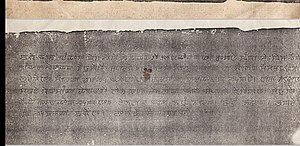| Language | Meetei language |
|---|---|
| No. of books | more than 120[1] (Nongsamei Puya, Sanamahi Laihui, Numit Kappa, etc.[2]) |
The Puya, also known as Meetei Puya,[3] (Meitei: ꯄꯨꯌꯥ), from pu "ancestors" and ya or yaba "accept", are scriptures or documents, written by various Maichou(s)[4] from time to time. The Meetei Puyas deal with the genealogy, literature, history, royalties, administration, creation and cosmology, philosophy, poetry, religious beliefs, etc.[5][6]
Puya such as "Nongsamei Puya" records the details about Muslim settlement during the reign of King Khagemba.[7]
Contents
Meitei philosophy
Meitei religion (Laining Leechat) and the corresponding philosophy (Wang-ulon) revolve around knowing the origin of life and protecting life from destruction by evil forces. This origin of life is known as the blood and represents the shared life force and common genetic pool of all living beings.[8]
Origin of life and its spread according to Puya
According to Wakoklon Heelel Thilel Salai Amailon Pukok Puya and various KhuNung Esei, life was created on Mt. Koupalu and spread throughout the world from there.[9]
- Awang Koupalu Asuppa
- Leima-Lai Khunda Ahaanba
- Nongthak-lei Mau lingliba
- Eelik Mapaan thariba
- O Lainingthou
Religion
| Puya | |
|---|---|
 | |
| Information | |
| Religion | Sanamahism |
| Language | Meetei language |
Puya like Sanamahi laihui ,Numit Kappa are the religious texts of Sanamahism written in the Meitei language and in the Meitei script. They are a particular kind of old narratives which form a definite class in rituals, deities of Meitei[10] containing traditional lore of the Meitei people of Manipur.
List of Puyas
There are a number of archaic Puya books, including[citation needed]
- Watchetlon Pathup
- Sanamahi Laihui
- Wakoklon Heelel Thilen Salai Amailon Pukok Puya[11]
- Ponpilang
- Thiren Layat
- Numit Kappa
- Sakoklon
- Sakoklon Thilel
Related pages
- Lists of deities in Sanamahism
- Meitei literature
- Sanamahi creation myth
- Sanamahism
- Wakoklon Heelel Thilel Salai Amailon Pukok Puya
Sources
- http://e-pao.net/epSubPageExtractor.asp?src=manipur.Arts_and_Culture.Meetei_Puya_and_Meetei_tradition
- http://e-pao.net/epPageExtractor.asp?src=features.Translation_of_our_holy_book_Puya_in_English_A_visionary_approach_By_Samarjit_Kambam.html
- http://e-pao.net/epSubPageExtractor.asp?src=news_section.opinions.The_Puya_and_Cheitharol_Kumbaba
- http://e-pao.net/epSubPageExtractor.asp?src=news_section.opinions.Puya_Meithaba_The_Burning_of_Meitei_Sacred_Scripture_By_Madhu_Chandra
- http://e-pao.net/epSubPageExtractor.asp?src=leisure.Essays.Puya_Meithaba_The_Date_Controversy_By_Chabungbam_Amuba
Further reading
References
- ^ Rena, Laishram (2010) [2009]. The early meitei history (PDF) (pdf). New Delhi: AKANSHA PUBLISHING HOUSE (published 8 September 2010). pp. 1–12. ISBN 978-81-8370-163-1.
{{cite book}}:|archive-date=requires|archive-url=(help) - ^ Laishram, Sadhana. "Conservation and preservation of Manuscripts in Manipur" (PDF).
- ^ Rajshekhar, M. "In violence-scarred Manipur, ancient scrolls show why AFSPA will not work". Scroll.in. Retrieved 23 October 2020.
- ^ Devi, Dr Yumlembam Gopi. Glimpses of Manipuri Culture. Lulu.com. ISBN 978-0-359-72919-7.
- ^ Raghu, Ningthoujam. "Awang Koubru Asuppa and Notion for Origin of Obliquity of Earth and Planets – KanglaOnline". Retrieved 24 October 2020.
- ^ Paochel, article (9 November 2020). "Discovery of Kangleipak" (PDF).
{{cite web}}: CS1 maint: url-status (link) - ^ Renuka, Mangsatabam. "The Muslim Settlers in Manipur during the Reign of Meidingu Khagemba" (PDF).
- ^ Puyam Nongdrei Khuman. "Blood is the source of Meetei religion and philosophy The Origin of Sanamahism". E-Pao. Retrieved 14 May 2019.
- ^ Raghu, Ningthoujam. "Awang Koubru Asuppa and Notion for Origin of Obliquity of Earth and Planets – KanglaOnline". Retrieved 24 October 2020.
- ^ Gourchandra, M. (1982). Sanamahi Laihui.
- ^ N. M. Meetei in: Arambam Noni, Kangujam Sanatomba (eds.), Colonialism and Resistance: Society and State in Manipur, Routledge, 2015, p. 223.
External links
- "KANGLEIPAK HISTORICAL & CULTURAL RESEARCH CENTRE - Hei-Ha - Epa Epu Gee Khongul Lirasi Salaicha Sing". Paochelsalaitaret.net. Retrieved 15 December 2018.